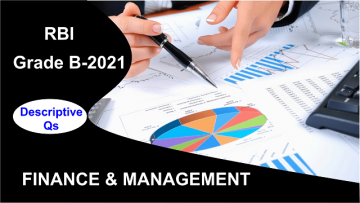
Dear Aspirant,
Any preparation starts with the thorough study of the syllabus and if you have understood the syllabus then you have completed one part of your journey. The prescribed syllabus gives you the basic knowledge of what you actually need to follow.
Friend, as you know that there is conspicuous change in the syllabus of the second phase of RBI Grade B exam-2021. The weightage of Subjective Type Knowledge is more. In this second phase, you are required to write Descriptive English Questions along with the questions based on Economic and Social Issues and Finance and Management.
Previously, the papers for ESI and FM were based on objective type questions; but now, these two papers will comprise Subjective questions along with Objective Questions.
- Time allotted- 120 Minutes; Marks- 100
- Objective- 30mn; 50 marks
- Descriptive- 90mn; 50 marks
- How will the Union Budget 2021-22 impact the Banking and Insurance Sector?
- Will the Union Budget-2021-22 pave the path of doubling the farmers’ income? Give your views.
- What are the problems proposed in the field of improving credit risk management?
- How strong can be the impact of the banks’ lending policy on the situation in the construction sector?
- What are the problems and theses as proposed in the field of credit policy of commercial banks in India?
- Does the use of big database technologies improve the credit risk management processes?
- What do you understand by Corporate Governance?
- What is the role of Corporate Governance for small and Medium Enterprises?
- How can good governance improve the performance of SMEs in emerging markets?
- What value can an independent director bring to a company?
- Why are the roles of chair and CEO different?
- What governance issues do investors look at before investing in a business?
- Do family-owned companies need corporate governance?
- What is the process and role of motivation?
- How do Financial Incentives motivate employees?
- Explain Herzberg’s two-factor theory and differentiate it from Maslow’s theory of Need Hierarchy.
- ‘Money holds the key to work motivation in modern business organization.’ Discuss.
- Critically examine how ‘Non-financial incentives are as strong motivators as the financial ones’.
- What is the relationship between liberalization and financial development and how it is measured?
- What are the limitations of dependence on monetary policy based on inflation targeting?
- When RBI reduces SLR (Statutory Liquidity Ratio by 50 basis points,, what does it mean and does it affect the economy?
- RBI, on behalf of Government, issues MSS bonds to mop up extra liquidity from the market. This is same as Open Market Operations (OMO), but has a significant difference. What is the difference?
- What is the difference between open and suppressed inflation?
- Does inflation affect various sections of a society in a similar way? If not, explain why?
- What are the various causes of inflation? How does RBI control it?
- What are the objectives of career planning and development?
- Explain the typical career pattern of a person belonging to the Regulatory Bodies of India.
- How will PM Wani Project help Financial Inclusion in the country?
- Discuss the tools which prevent frauds in banking transactions?
- What are the main determinants of the development of online information services?
- Does the development of information technology industry 4.0 reduce the asymmetry of information between counter parties of financial transactions?
- What is more important in times of crises (such as Pandemics etc.): Leadership or Management?
- How can leadership and management be instilled in employees?
- Does Monetary Policy control the chaos in financial market? If yes, how?
- What are the benefits of Reg Tech?


